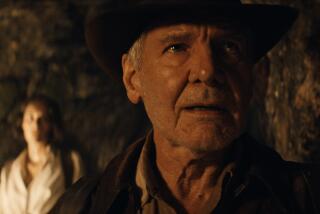STAGE REVIEW : ‘RUM & COKE’: A TASTE OF REAL WORLD
With everyone else looking back to Vietnam this week, South Coast Repertory invites us to look back to the Bay of Pigs. The play, at SCR’s Second Stage, is Keith Reddin’s “Rum and Coke.”
It is a “docu-satire” about two bright young people at the dawn of the Kennedy era who ask what they can do for their country and who are informed: Lie, betray your clients and keep your mouth shut.
If you comply, like Linda, the hotshot reporter from Time (Anni Long), you’ll get a nice job in Jackie’s press office. If you falter, like Jake, the humble political scientist from Harvard (Peter Crombie), you’ll end up in hot water for trying to pass secrets to the papers. Either way, you’ll find out how things work in the real world.
It’s a coming-of-age play, with Linda and Jake (who are brother and sister) standing for those naive Americans who hadn’t realized, up to the Bay of Pigs, that fighting communism would naturally force this country to do the sort of underhanded things that communists did, like financing revolutions in other countries.
Nor had we foreseen how badly our government could botch such an effort. Reddin is too young to remember the Bay of Pigs personally (this is only his second play), but he’s got the effect of it right. As a radio commentator of the time put it, it was the day when we began to admit the possibility that we were just another world power, and a clumsy one at that. Welcome, indeed, to the real world.
Interesting that, in this year of self-examination, it took a playwright to connect the Bay of Pigs with Vietnam--and, even more, with Nicaragua. (Ears prick up at South Coast when Ron Boussom’s eager CIA agent describes his army of exiled Cubans as “freedom fighters.”) But if “Rum and Coke” is meant as a warning, it can be read in two ways.
In a general sense, it seems to show the folly of imposing yourself on somebody else’s revolution. But Jake’s real problem with the invasion--the reason he tries to abort it by tipping off the press (who immediately call up the CIA)--is that he knows it’s to be a fatally half-hearted effort, with no hard support from the U.S. mainland for the contras who have become his friends (John Ellington, Tony Plana.)
So the moral of the story could well be: Go for it. Were this a finer-grained play, the ambiguity would enrich it. Reddin does try for complexity in Jake’s relationship with his aggressive sister (Dad always liked her best), and there is a stab at Pirandello in the business about a remembered snapshot of the old Cuba that Jake turns out to have misremembered.
But most of “Rum and Coke” is pretty broad, as when a rich Texan (Richard Doyle) symbolically rids himself of a heckler (Art Koustik) by kneeing him in a vital area, or when Richard Nixon (Doyle again) clanks onto the stage like the Tin Man.
At those moments, the play is written in crayon, and crayon messages shouldn’t be ambiguous--the viewer just ends up confused. We’re grateful these days when any playwright turns his attention to events outside the circle of the family, but this first “docu-satire” seems somewhat stuck between its parent genres.
The acting, under David Emmes’ direction, is generally on the mark, particularly John-David Keller as an upper-level CIA type who combines Ivy League condescension with brutality, and calls the result finesse. The crayon here has a razor blade in it. One does wonder about Crombie’s approach to the role of Jake. He suggests the campus nerd of the 1980s more than the campus idealist of the 1960s. Director Emmes is old enough to remember the latter, if Crombie isn’t.
The physical production is fabulous--a big word for such a small stage, but accurate. Cliff Faulkner’s constantly changing set uses small furniture pieces to tell us the place and big background posters of Ike, J.F.K., Richard M. Nixon, et cetera, to tell us the date; Susan Denison’s costumes evoke everything from the Fidel look to the Jackie look; Peter Maradudin’s lighting has room for terror.
In the end, “Rum and Coke” doesn’t satisfy--except visually. Yet at some level, and particularly this week, it refreshes.
Plays Tuesday-Saturday at 8:30 p.m., Sunday at 8 p.m., with Saturday and Sunday matinees at 3 p.m. 655 Town Center Drive, Costa Mesa, (714) 957-4033.
More to Read
The biggest entertainment stories
Get our big stories about Hollywood, film, television, music, arts, culture and more right in your inbox as soon as they publish.
You may occasionally receive promotional content from the Los Angeles Times.










